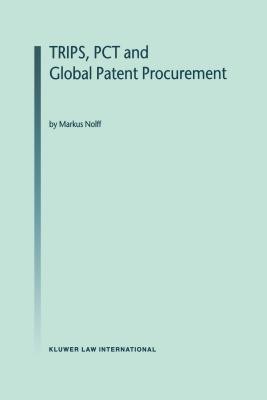
- We will send in 10–14 business days.
- Author: Markus Nolff
- Publisher: Kluwer Law International
- Year: 2001
- Pages: 301
- ISBN-10: 9041197400
- ISBN-13: 9789041197405
- Format: 15.6 x 23.4 x 1.9 cm, hardcover
- Language: English
- SAVE -10% with code: EXTRA
Reviews
Description
The introduction of the Trade-Related Aspects of Intellectual Property Rights (TRIPS) Agreement has established a global patent system requiring a high standard of patent protection. However, any consequential increase in patent applications will further strain the resources of patent offices worldwide. A monolithic "World Patent Office" granting "World Patents" will most likely remain an utopian idea but the Patent Cooperation Treaty (PCT) has successfully demonstrated how to emulate a "World Patent Office" processing "World Patent Applications". The current PCT only goes halfway towards the grant of a patent, hence, the logical step to handle an increase in patent applications would be to further develop the PCT towards a patent grant procedure. This has been recognised and in late 2000, the Assembly of the PCT Union decided to set up a special body to consider a formal request by the United States for a "Reform of the Patent Cooperation Treaty". The author discusses, inter alia: TRIPS and the PCT, their provisions and applications; the impact of TRIPS on the PCT; any relationships between the provisions of TRIPS and the PCT, and whether such relationships must be taken into account when interpreting TRIPS or the PCT; potential ways of further developing the PCT, in particular, merging Chapters I and II of the PCT; offering supplemental PCT searches; requiring a complete substantive examination for every PCT application; adding a PCT Registration/Extension Protocol for registering or extending national patents; offering an optional PCT Patent; offering a PCT Technical Opinion.
EXTRA 10 % discount with code: EXTRA
The promotion ends in 17d.09:59:03
The discount code is valid when purchasing from 10 €. Discounts do not stack.
- Author: Markus Nolff
- Publisher: Kluwer Law International
- Year: 2001
- Pages: 301
- ISBN-10: 9041197400
- ISBN-13: 9789041197405
- Format: 15.6 x 23.4 x 1.9 cm, hardcover
- Language: English English
The introduction of the Trade-Related Aspects of Intellectual Property Rights (TRIPS) Agreement has established a global patent system requiring a high standard of patent protection. However, any consequential increase in patent applications will further strain the resources of patent offices worldwide. A monolithic "World Patent Office" granting "World Patents" will most likely remain an utopian idea but the Patent Cooperation Treaty (PCT) has successfully demonstrated how to emulate a "World Patent Office" processing "World Patent Applications". The current PCT only goes halfway towards the grant of a patent, hence, the logical step to handle an increase in patent applications would be to further develop the PCT towards a patent grant procedure. This has been recognised and in late 2000, the Assembly of the PCT Union decided to set up a special body to consider a formal request by the United States for a "Reform of the Patent Cooperation Treaty". The author discusses, inter alia: TRIPS and the PCT, their provisions and applications; the impact of TRIPS on the PCT; any relationships between the provisions of TRIPS and the PCT, and whether such relationships must be taken into account when interpreting TRIPS or the PCT; potential ways of further developing the PCT, in particular, merging Chapters I and II of the PCT; offering supplemental PCT searches; requiring a complete substantive examination for every PCT application; adding a PCT Registration/Extension Protocol for registering or extending national patents; offering an optional PCT Patent; offering a PCT Technical Opinion.


Reviews